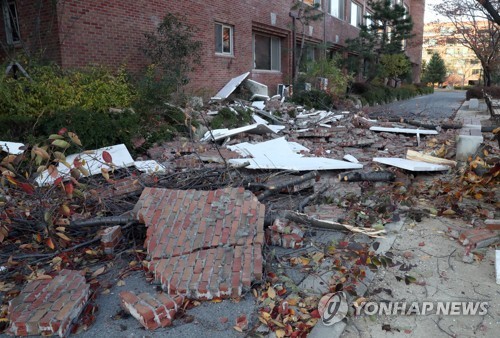
Tremors were felt as far as Seoul hundreds of kilometers away. Fourteen people were hurt as of 7 p.m., firefighters said. Most suffered minor injuries while a woman in her 70s was found seriously wounded after being buried in the debris of a collapsed wall. But there were no reports of casualties or serious damage to facilities including nearby nuclear power plants.
The Korea Meteorological Administration (KMA) said the quake was centered in an area some 9 kilometers north of the industrial city on the southeastern coast with a shallow depth of 9 kilometers. It occurred at around 2:29 p.m. and eight aftershocks with magnitudes ranging from 2.4 to 4.6 followed.
It marked the second-strongest quake since the country began to monitor seismic records in 1978, according to the weather agency. Korea's biggest magnitude 5.8 earthquake hit Gyeongju, near Pohang, last year.
But residents felt more powerful impact this time than the Gyeongju earthquake due to the shallow depth.
"We understand that the quake occurred at a shallower location than the one that hit Gyeongju," a KMA official said. "The shallower the depth is, the greater the vibration gets on the ground."
The weather agency said that aftershocks may continue to occur over the next few months.
The quake was felt across the nation, including Seoul about 374 km away from Pohang, as well as the island of Jeju, sparking a flood of reports of buildings shaking, books falling from shelves and frames falling off walls.
Some 27 buildings in Pohang have been partially damaged. The KTX station in the same city has temporarily closed down after its ceiling has collapsed due to the impact.
There were dozens of distress calls from citizens locked in elevators and also blackouts in dozen other residential and business buildings.
The Ministry of Education decided to postpone the state-administered college entrance exam by a week as the quake caused fissures in some school buildings in Pohang. The education authorities will close all schools in the city Thursday and Friday.
The region is also home to nuclear power plants, but the reactors are working normally, officials said. The nuclear waste disposal facility in Gyeongju and steelmaker POSCO's plant in Pohang are also showing normal operations, they said.
But some buildings, including one at Handong Global University, saw part of their outer walls come off and fall to the ground, damaging cars parked below. Some other buildings developed cracks. Many windows were also seen broken in the wake of the quake.
About 100 residents of an apartment complex near the epicenter fled their homes to safer areas after the quake hit. Some were wearing only short-sleeve shirts as they hurried out on the coldest day yet this fall.
"Frames hanging on a wall fell to the floor and books fell from shelves," a 40-year resident of the apartment complex said. "All this happened in an instant and I was surprised."
Students at a nearby elementary school were seen evacuating classrooms.
Nearly 6,000 phone calls flooded regional fire stations across the nation, with people reporting that their homes shook and many of them asking if it was indeed an earthquake.
"I, along with my daughter, raced down the stairs as the doors and windows of my house on the fourth floor rattled for minutes," Cho Mi-yeon, a 64-year-old resident in Changwon, said. "Some 20 minutes later, I returned home and then packed some clothes to bring out with me in case of aftershocks."
The Ministry of the Interior and Safety sent its officials to the affected region to assess and manage the aftermath of the quake.
It also plans to check and ensure the safety of school buildings in the affected region where high-schoolers take the state-administered college entrance exam on Thursday.
President Moon Jae-in, upon returning from a trip to Southeast Asia, held a meeting with his senior secretaries and ordered thorough examination of key industrial facilities including nuclear reactors.
Political parties called on the government to promptly handle the aftermath of the quake.
"The authorities should make all-out efforts to minimize the damage and carry out the restoration work," said Back Hye-ryun, the spokeswoman of the ruling Democratic party.


























